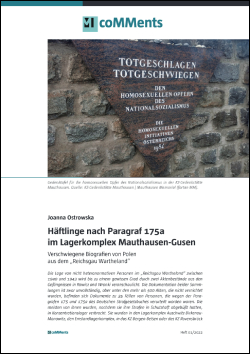Prisoners according to paragraph 175a in the Mauthausen-Gusen camp complex. Hidden biographies of Poles from the "Reichsgau Wartheland".
##plugins.themes.bootstrap3.article.main##
Abstract
The situation of non-heteronormative people in the Wartheland in 1940-1943 is illustrated to some extent by two collections of files from prisons in Rawicz and Wronki. The documentation of both collections is incomplete, but among more than five hundred files, thirty-four cases of people convicted under paragraphs 175 and 175a of the German Penal Code survived. Most of them, after serving their sentences under protective custody, were sent to concentration camps. They were transported to the Auschwitz-Birkenau-Monowitz camp complex, Emsland camp complex, KZ Bergen-Belsen or KZ Ravensbrück. Some were considered war criminals who, for the time, remained in isolation. Four of them were sent to the Mauthausen-Gusen camp complex.
The researched biographies of Mauthausen-Gusen complex prisoners sentenced under paragraphs 175 and 175a presented in this text are a prelude to further research. All of the criminal cases studied here occurred between 1940 and 1943 and involved only Polish citizens. The process of reconstructing their biographies is, on the one hand, another step in recovering the history of non-heteronormative people from East-Central Europe of nationalities other than German, who were persecuted during World War II. On the other hand, it is a starting point for further research to complete the narrative of both paragraphs' victims at the Mauthausen-Gusen Memorial.
